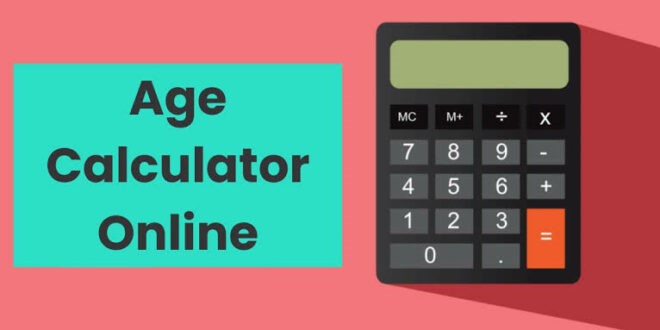The age calculator has become a staple across various sectors, including law, education, healthcare, and even financial planning. It saves time and ensures accuracy, eliminating the need for manual calculations, which can often lead to errors. This article delves into the workings of an age calculator, its wide range of applications, and why it has become such an indispensable tool in today’s world.
What Is an Age Calculator?
An age calculator is a digital tool that determines a person’s or object’s exact age based on two dates: the birthdate or start date and the current date or a custom date for comparison. By inputting these dates, the calculator computes the number of years, months, and days that have passed, giving a precise result that can be used for a variety of purposes.
Most age calculators are available online and are free to use. They provide instant results and have become an essential tool for anyone needing to calculate age for personal, professional, or legal reasons. Some calculators even go beyond simply telling you your age—they can project how old you will be on a future date or how old you were at a specific time in the past.
How Does an Age Calculator Work?
At its core, an age calculator works by subtracting two dates: the birthdate and either today’s date or a custom date selected by the user. Here’s a step-by-step breakdown of how the calculator performs this task:
- Input the Dates: The user enters the necessary dates, typically a birthdate or start date and the current date or another specified date.
- Calculate the Difference: The calculator uses a set algorithm to calculate the time difference between the two dates. This difference is expressed in terms of years, months, and days. Advanced calculators can also account for hours, minutes, and seconds.
- Adjust for Leap Years: Leap years add an extra day every four years, which can complicate calculations. An age calculator automatically adjusts for leap years to ensure that the results are as accurate as possible.
- Display the Results: The final result is displayed, showing the age in years, months, and days, or sometimes with more detailed breakdowns, depending on the tool’s capabilities.
Why Accuracy in Age Calculation Matters
You may wonder why precision in calculating age is so important. After all, can’t you just estimate a person’s age based on their birth year? In many situations, rough estimates simply aren’t good enough, especially in fields where accuracy is essential. Here are some examples where precision in age calculation is crucial: Flip a coin and let chance decide for you! Simply click the button below and see if it’s heads or tails.
1. Legal Requirements
Many legal requirements depend on a person’s exact age. For instance, there are strict age regulations when it comes to activities like voting, drinking, driving, and marriage. Failing to meet these age requirements—even by a single day—could result in legal penalties or restrictions.
Additionally, legal documents often require an exact age to validate agreements or eligibility for certain rights. Age calculators ensure that no mistakes are made in these instances, helping to avoid potential legal complications.
2. Healthcare and Medical Decisions
In healthcare, knowing a patient’s exact age is critical for prescribing the correct treatments, medications, and therapies. Children’s health and developmental milestones are particularly age-sensitive, with vaccination schedules, growth monitoring, and treatment protocols all depending on precise age calculations.
Age calculators are also useful in geriatrics, where certain age-related conditions or treatments become relevant at specific life stages. Accurate age calculation helps doctors tailor their care to the needs of the patient, improving overall health outcomes.
3. Financial Planning and Retirement
When planning for retirement, precise age calculations are essential for determining when someone is eligible for pensions, retirement accounts, and social security benefits. Age calculators help people know exactly how old they will be at specific financial milestones, ensuring that they can plan their future effectively.
This tool is also crucial in estate planning, where age may determine when beneficiaries can access inheritance or when certain tax obligations come into effect.
4. Education and School Enrollment
Schools and educational institutions often have age requirements for admission into specific programs. Whether it’s ensuring that a child is old enough to start kindergarten or determining a student’s eligibility for scholarships, an age calculator can quickly verify that age-related criteria are met.
In competitive environments like sports or academic contests, age limits are strictly enforced. Accurate age calculation can help ensure fair participation by verifying that all candidates meet the age eligibility requirements.
Applications of Age Calculators
Age calculators are versatile tools with a wide range of applications. Below are some of the most common ways they are used across different industries and personal contexts:
1. Tracking Milestones
People often use age calculators to track important milestones, such as birthdays, anniversaries, or other significant life events. Parents may use them to track their children’s exact age in months or days, especially during their early years. Similarly, people planning significant life events like milestone birthdays or anniversaries rely on age calculators to know exactly how much time has passed.
2. Verifying Legal Age
As mentioned earlier, legal age requirements exist for various activities and rights. Governments, institutions, and businesses use age calculators to quickly verify that individuals meet these legal criteria. This ensures that age-based laws are followed accurately, whether it’s for obtaining a driver’s license, signing contracts, or accessing certain public services.
3. Age Comparisons
Age difference calculators, a specialized form of age calculators, are often used in relationships or between siblings and friends to compare ages. In competitive settings, these calculators determine the eligibility of participants for age-restricted contests or leagues.
4. Retirement and Pension Planning
Age calculators play a critical role in financial planning, helping individuals determine when they will reach certain age-based milestones, such as becoming eligible for retirement accounts or pensions. Knowing these dates allows people to plan ahead, ensuring they save adequately and make informed decisions about their future. Our mortgage calculator helps you estimate your monthly mortgage payments, including principal, interest, taxes, and insurance (PITI).
5. Historical Age Calculation
Age calculators can also be used to calculate the age of historical figures or determine how old someone was at a particular event in the past. Historians and researchers use these tools to contextualize historical events, understanding the timelines and lifespans of people in history.
Types of Age Calculators
Several types of age calculators exist, each designed to fulfill specific needs:
1. Basic Age Calculator
This is the most common type, designed to calculate a person’s age from their birthdate to the present date. It’s typically used for personal milestones like birthdays and anniversaries.
2. Age Difference Calculator
This type of calculator compares the ages of two individuals, calculating the age gap between them. It’s useful in determining relationships or setting eligibility in sports and competitive activities.
3. Chronological Age Calculator
Chronological age calculators are used primarily in medical and educational contexts to assess developmental milestones. They provide a detailed breakdown of age to ensure that age-based decisions are made appropriately.
4. Future Age Calculator
This calculator determines how old someone will be at a specific point in the future, making it particularly useful for financial and retirement planning. Users can project how old they’ll be when they hit major life milestones.
5. Past Age Calculator
A past age calculator helps determine how old someone was at a specific time in the past. This is especially useful in historical research, anniversary commemorations, or even for personal curiosity about significant life events.
The Role of Leap Years in Age Calculation
One of the complexities of calculating age is accounting for leap years. Leap years occur every four years and add an extra day to the calendar, which can affect the accuracy of age calculations over time. An age calculator automatically adjusts for these leap years, ensuring that the results are precise.
Without this adjustment, an age calculation could be off by days, which can be significant in fields where precision is critical, such as healthcare or legal contexts.
Conclusion
Age calculators https://agecalculator.net.in/ have become indispensable tools in modern life, offering accuracy, convenience, and speed for determining a person’s exact age in a variety of settings. Whether it’s tracking personal milestones, verifying legal eligibility, or planning for retirement, these tools provide an easy and reliable way to calculate age. By accounting for leap years and other calendar intricacies, age calculators ensure that users get precise results every time.

 Join Daily Trust WhatsApp Community For Quick Access To News and Happenings Around You.
Join Daily Trust WhatsApp Community For Quick Access To News and Happenings Around You.


